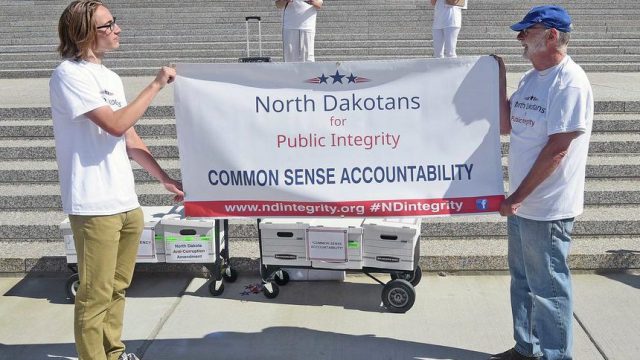Of Course Ethics Investigations Should Be Secret

TOM STROMME/Tribune Alex Hilzendeger, left, and Norton Lovold hold a banner in front of boxes of petitions outside the state capitol in Bismarck on Monday morning as speakers Dina Butcher, left, and Ellen Chaffee address a crowd of 32 people. The petitions if approved would place a measure on the November ballot to amend the state constitution. For a video of Butcher go to www.bismarcktribune.com.
During the last election cycle a left-wing, Democrat-aligned group filed an ethics complaint against Republican candidate Tom Campbell because one of his campaign ads featured him standing in front of a truck with his business logo on it. The complaint was announced to the media by the left wing groups filing it.
The complaint went nowhere. But it did generate negative headlines for Campbell. Which was the point.
Also during the last election cycle David Thompson, the North Dakota Democrats’ candidate for Attorney General, filed an ethics complaint against candidate Kevin Cramer alleging that the Republican and his wife had inappropriately reimbursed themselves for campaign expenses. The North Dakota Democratic Party backed Thompson’s play.
The Associated Press fact checked the accusations and found them wanting. The complaint, again, went nowhere.
But it did generate headlines, and fed into attacks Democrats launched on Cramer accusing him of being “crooked.”
Thompson also accused then-Governor Jack Dalrymple of bribery back in 2013. His arguments were the basis of a failed effort to initiate an indictment against Dalrymple.
Suffice it to say that our liberal friends are fond of using accusations of ethical misconduct as a political weapon. In fact, they’re so fond of it, they backed a ballot measure to enshrine a vehicle for just that sort of gamesmanship in our state constitution.
The left wing activists behind Measure 1 last year were motivated by a desire to create a potent political weapon and to suppress political activity.
Now a Republican bill which aims to implement Measure 1 would take some of the teeth out of it by making the proceedings around an ethical accusation a secret until there are findings to be released. It would also impose criminal penalties on anyone who “knowingly” makes false accusations:
House Bill 1521, legislation to implement an ethics measure passed by North Dakota voters in the November 2018 election, was introduced by Rep. Chet Pollert, R-Carrington, the House majority leader, and Sen. Rich Wardner, R-Dickinson, the Senate majority leader.
Under the bill, which will be heard today by the House Ethics Committee, ethics complaints against state government officials, including lawmakers, would be kept confidential throughout the process until the allegations were investigated and formal findings were issued.
Any meetings to investigate or try to resolve a complaint, as well as the identity of the accused official, also would be kept confidential under the bill.
Here’s Brandon Medenwald, a Fargo Democrat who ran an unsuccessful campaign for the Legislature last year, reacting to this news:
North Dakotans don’t give a damn about legislator reputations. We want transparency, not secrecy. #ndpolhttps://t.co/EprgkX97nl
— Brandon Medenwald (@bmedenwald) February 12, 2019
This isn’t about transparency. If it was, Measure 1 would have been limited to, say, enhancing reporting of campaign finances (something I very much support).
Measure 1 is really about providing a venue for political vendettas. It’s about Democrats, who have been out of power for decades in North Dakota, looking for a way to climb back into power.
The idea that panels of political appointees can enhance ethics is a very stupid one. I’ve yet to see a correlation between government ethics panels and ethical government. I have always opposed the creation of an ethics panel in North Dakota because, in practice, they aren’t really about ethics.
But if we’re going to have one, we should ensure its proceedings can be used for partisan games.
If our Democratic friends get their way, it almost certainly will be.




